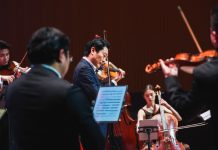BEIJING: Receiving a Plum Blossom Award, China’s top honor for opera and drama, is the dream of many an opera performer. Su Yanrong, one of China’s finest Gezi Opera artists, won hers in 2009 at the age of 30. Gezi is the only traditional Chinese opera originating from the southern areas of Fujian Province. It then arose from Taiwan and now thrives on both sides of the Straits.
Su sees the folk art as an extraordinary part of traditional temple fairs, where people dressed in beautiful costumes came to entertain the crowds with their moving melodies. “It’s true that most people today are more familiar with big operas such as Peking Opera and Yuju, but in Fujian, Gezi is popular as it absorbs local characteristics,” Su told Beijing Review.
Devoted to Gezi Opera for 30 years, Su has brought this folk art to many places, showcasing the beauty of Chinese opera and Fujian’s culture together with her colleagues from the Xiamen Gezi Opera Research Center.
Qiaopi, a Gezi Opera performance crafted over the past four years, hit the stage at Beijing’s Tianqiao Performing Arts Center on July 16. The play focuses on those Chinese who left their native country to work across Southeast Asia in the 19th century. Qiaopi is the name given to the letters written home by Chinese emigrants which also functioned as remittances. Their key function was to preserve family ties.
Even though most Beijing audiences aren’t able to understand the singing and dialogue in Fujian’s local (Hokkien) dialect, Su, one of the leading actresses in Qiaopi, wasn’t too worried about their feedback.
Besides the subtitles appearing on LED screens, today’s spectators are more interested in a form of entertainment with unique features, she said.
Compared with its peers, Gezi Opera, with about 100 years of history, is a young opera genre. It incorporates elements from Peking Opera, Liyuan Opera, popular in south Fujian, and Beiguan Opera—which actually has a large Taiwanese fan base.
It is rich in rustic character with lots of singing and little dialogue. The simple and moving melody is easy to pick up. The lyrics are lively and catchy.
In 2013, UNESCO included qiaopi in its Memory of the World Register, established in 1992 to preserve the world’s documentary heritage. Zeng Xuewen, a member of the Xiamen Gezi Opera Research Center, recognized its potential and created an eponymous play: Qiaopi.
“Developing this cultural concept into a play was one of my most challenging undertakings. Instead of introducing what qiaopi is, we needed to explain it to audiences through a touching story,” Zeng told Beijing Review.
Based on the true historical figure of Huang Rixing, the play starts with his tale of woe. The folk artist from Fujian travels to Southeast Asia to make money so as to create a better life for his fiancee, Ruyi, portrayed by Su. Unfortunately, he is trafficked as a “coolie,” a derogatory term used to describe unskilled laborers in late 19th-century Asia, to work in a mine. Once there, he meets many people who share similar experiences.
–The Daily Mail-Beijing review news exchange item






